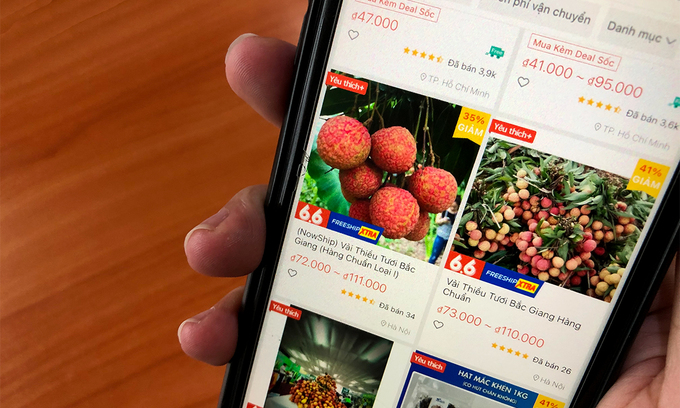Agricultures, Foods, News & Event, Uncategorized
E-commerce a distribution avenue for fresh fruits amid pandemic

The Covid-19 pandemic has paved the way for e-commerce in distributing fresh agriculture produce.
Earlier this month, the famous lychee grown in the northern province of Bac Giang was sold on six e-commerce platforms for the first time.
The initiative was backed by the Ministry of Industry and Trade which partnered with Shopee, Tiki, Sendo and other platforms to help farmers in Covid-19 hotspot Bac Giang, where many areas are under lockdown.
The e-commerce platforms enabled nationwide distribution of the popular fruit. One of the partners, logistics company Viettel Post, committed to delivering the fruit within six to 48 hours after harvest to nationwide localities using cold-storage trucks and airlines.
Transporting agriculture produce is more expensive than regular goods, but the company wants to support Bac Giang farmers by keeping the rate at VND15,000 ($0.65) per five kilograms for all domestic destinations, said Viettel Post CEO Tran Trung Hung.
The company has also acquired necessary permits to export the lychees to Germany.
PostMart, an e-commerce platform developed by state-owned logistics company Vietnam Post, has reported over VND8.5 billion ($370,000) worth of orders since the end of last month.
Although Vietnam’s e-commerce has experienced double-digit growth in recent years with big players spending billions of dollars to increase their market share, fresh agriculture produce has not been a popular item on e-commerce platforms.
“This is because distributing fruits online is something unfamiliar to most Vietnamese farmers,” economist Nguyen Tri Hieu told VnExpress International.
They are used to selling their produce in bulk to traders and most of them do not have knowledge of online distribution and have never experienced direct interaction with online customers, he said.
However, the Covid-19 pandemic has created an opportunity for e-commerce to emerge as a viable distribution channel for farmers, creating a new way to sell their produce, he added.
Several e-commerce firms are facilitating the process. Employees of Vietnam Post and Viettel Post have been knocking on farmers’ doors to teach them how to open online trading accounts, upload images of their fruit and provide details to customers using just their smartphones.
Sendo employees are also teaching farmers how to conduct a livestream session to interact directly with customers.
Most e-commerce platforms have offered to provide discounts on delivery to boost sales while guaranteeing the quality of the produce will be preserved.
Hieu said that in the short term, Vietnamese customers will likely have a skeptical attitude toward online purchase of fresh fruits as most people prefer to touch and smell the produce before making their decisions.
He added: “The latest initiative could help change the habits of both farmers and customers and give e-commerce platforms a more solid place in consumers’ mind as the go-to place for all needs.”
